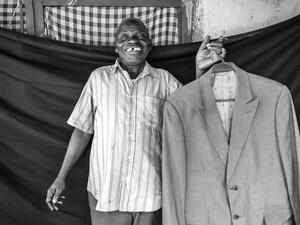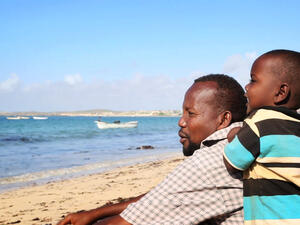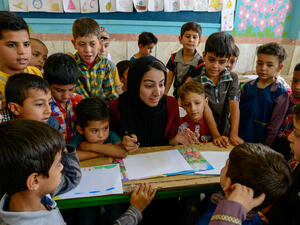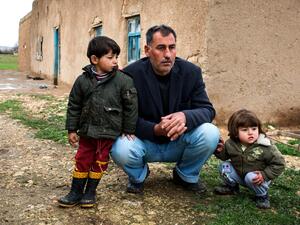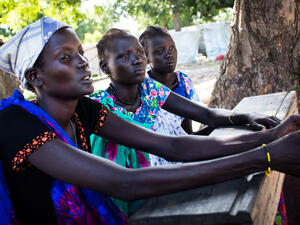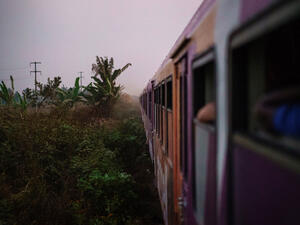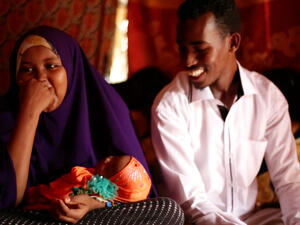Returning to the Angolan enclave of Cabinda
Returning to the Angolan enclave of Cabinda

The return convoy crossing the Massabi border into Angola's Cabinda province from the Republic of the Congo.
CABINDA, Angola, August 3 (UNHCR) - "We left Angola together, and together we are finding our way back 12 years on," said João Taty, looking at his wife Edith Mboumba sitting by his side in one of two buses bringing 52 refugees home in a convoy organised by UNHCR from Brazzaville and Pointe Noire in the Republic of the Congo.
The group crossed the northern border of Massabi in Cabinda province, the Angolan enclave separated from the rest of the country by a strip of Congolese territory, on Saturday. They were the first group of refugees to be repatriated in an organised manner since 2003. Others have returned on their own from time to time.
Gazing out of the window of the bus, Taty said he did not expect to get rich, but wanted to have a better life than he had in Pointe Noire, where he sought refuge in 1993. "To find work in Congo became very difficult and I could not stand seeing my family hungry anymore. My brother and sister went back already, and all I want is to find work as a painter."
Taty and Mboumba have three children, one still a baby. They fled Angola after their village in Dunge municipality was burnt by soldiers during the country's civil war that lasted 27 years and ended in April 2002. They were separated from each other on their way to the Republic of the Congo, but he managed to find her in a refugee camp with the assistance of the Red Cross.
"To be alone in the camp was very difficult," Mboumba recalled. "I did not have much hope that we would be reunited, but he found me." For most of the time they spent in Brazzaville, their home was in the Angolan quarter of the city - Kugim Bakar.
Upon their return, the couple intends to settle in the provincial capital, also called Cabinda, where his brother and sister are living.
Basic conditions in Cabinda are better than in most provinces of the country, with lush rainforests and a coast from where some 700,000 barrels of oil are pumped daily - 60 percent of the total Angolan production.
Many villages have wells and potable water, most have health posts and some run on solar power. In a heavily-mined country, safe arable land is rare. But returnees heading for the countryside receive 0.5 to one hectare of land, already mechanically prepared by tractors, ready for seeding. Most land in Angola - which had been a big producer of crops, but now imports most of the food consumed in the country - does not even benefit from animal traction.
In Cabinda town, where 100,000 of the 300,000 inhabitants of the province are living, a new neighbourhood called Santa Catarina is being created to accommodate new returnees like Taty and his family.
According to Dona Aldina da Lomba, the Provincial Director of the Ministry of Social Affairs and Reintegration (MINARS), "Santa Catarina has water and energy, and all new returnees are receiving a brick mould as part of their non-food item kit, as well as assistance to build their own houses. We are also providing an agricultural kit and a small plot of land close by for subsistence agriculture."
He admitted that for some 19,000 returnees who came back three or four years ago, "reintegration was not done in a productive way". Some returnees were not resettled in their chosen destinations and ended up building their new houses in areas other than that of their final destinations. Others never received doors for the houses they built in the self-construction programme, and many never found work.
João Macaia Tati, the Administrator of Cacongo Municipality, says this situation has changed. "Reception conditions have been created and we are aware that a lot of our population is living abroad. We want them back."
Cabinda is the only province in Angola which still has a guerrilla group, the Front of the Liberation of the Enclave of Cabinda (FLEC). UNHCR does not promote repatriation to Cabinda, but brings refugees at times to see for themselves the conditions of life in their areas of origin. Last weekend's initial organised repatriation movement was in some ways a test to ascertain the conditions for voluntary repatriation and to make preparations for the reception of larger groups of refugees who have expressed an intention to return home.
Although FLEC has not been active and its members have been hiding in remote areas of the Mayombe forest, there are some 30,000 government troops deployed in the province, and numerous checkpoints on most roads and in remote areas.
The returnees will be settling in areas considered safe, in and around town in Cabinda. They did not seem concerned with any FLEC revival. "My three brothers who were also refugees in Brazzaville returned three years ago," said Lourenço Paixão, a 23-year-old returning alone. "I am the last one to come back. We talked a lot on the phone, they all have jobs and they all say Cabinda is calm."
On arrival, all children under five were vaccinated against polio, and later in the transit centre built by MINARS, birth certificates were issued. The returnees were also enrolled in the identification campaign and will receive identity cards within a week.
The day following his arrival, Taty and his family entered the bus for the last time, on their way to his sister's home, 20 km away from the transit centre. Armed with very few personal possessions, more than 70 kg of food provided by the World Food Programme, and very general directions, he received a cool reception, unlike many other returnees in this group. His sister Janine kept repeating she was glad to see him, but could not accommodate the family for long.

João Taty and his family arriving at his sister's place in Cabinda.
"I came back without any money, but I will find a job," said Taty. "I am still glad I came back. It won't be easy, my wife is sick with malaria, but we have been through tough times before. Now we are home."
There are some 3,500 Angolan refugees registered in the Republic of the Congo.
By Maria Benevides
UNHCR Angola


